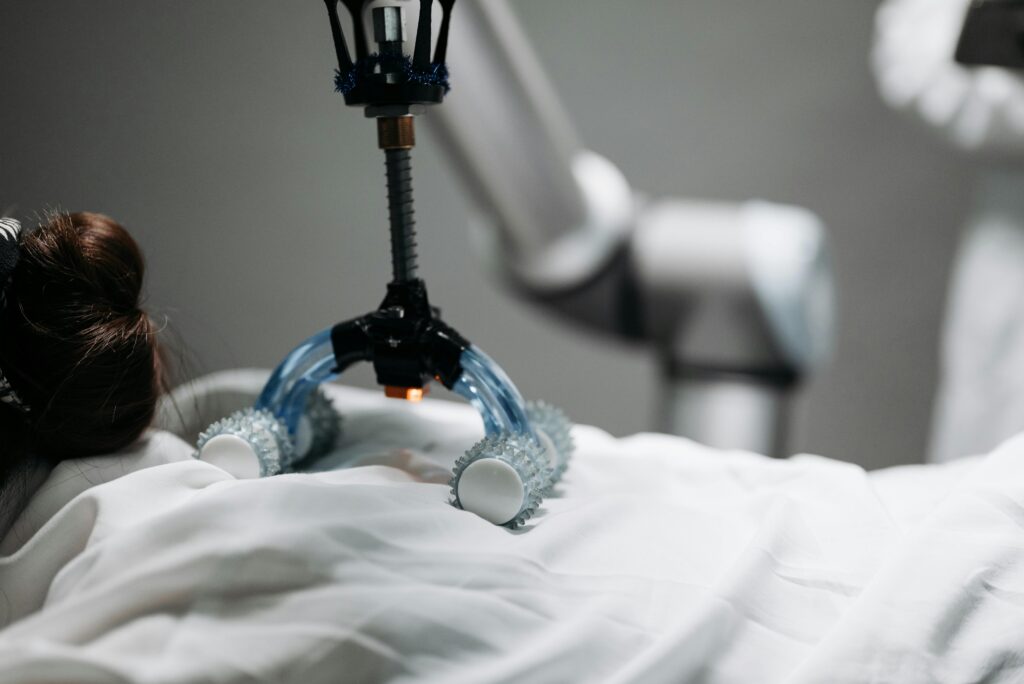Artificial Intelligence (AI) is no longer a futuristic concept confined to science fiction. In 2025, it’s a transformative force reshaping the healthcare landscape worldwide. From early disease detection to personalized treatment plans and streamlined hospital operations, AI is making healthcare smarter, faster, and more efficient—improving outcomes for patients and providers alike.
Let’s dive into how AI-driven technologies are revolutionizing diagnosis and treatment, with real-world examples illustrating this cutting-edge evolution.
🤖 Early Detection: Catching Diseases Before Symptoms Appear
One of the most significant impacts of AI in healthcare is its ability to identify diseases early—often before traditional methods detect them. Early diagnosis can dramatically increase survival rates and reduce treatment costs.
How AI Does It:
- Medical Imaging Analysis: AI algorithms can analyze X-rays, MRIs, and CT scans with incredible precision, spotting anomalies that human eyes might miss. For example, Google’s DeepMind developed an AI model that detects breast cancer in mammograms more accurately than radiologists alone.
- Pattern Recognition in Electronic Health Records (EHRs): AI can sift through vast patient data to identify patterns indicating risk factors for chronic diseases like diabetes, heart failure, or sepsis, enabling preemptive care.
- Wearables and Continuous Monitoring: Devices like smartwatches now use AI to monitor heart rhythms, detect atrial fibrillation, and alert users and physicians to early warning signs.
Real Hospital Example:
Mayo Clinic has implemented AI-powered imaging tools that assist radiologists in diagnosing strokes faster, reducing the critical time needed for treatment and improving recovery chances.
🎯 Personalized Medicine: Tailoring Treatment to the Individual
Healthcare has historically followed a “one-size-fits-all” approach. AI is changing that by enabling precision medicine—customizing treatments based on a patient’s unique genetic makeup, lifestyle, and environment.
AI’s Role in Personalization:
- Genomic Data Analysis: AI systems analyze genetic sequences rapidly to identify mutations linked to cancers or rare diseases, helping doctors select targeted therapies.
- Drug Discovery and Dosage Optimization: AI algorithms predict how patients will respond to medications, minimizing trial-and-error prescribing and adverse effects.
- Virtual Health Assistants: AI-powered chatbots provide patients with personalized health advice, medication reminders, and lifestyle coaching tailored to their specific needs.
Real Hospital Example:
At Mount Sinai Health System in New York, AI-driven genomic analysis is being used to develop individualized cancer treatment plans, improving survival rates and minimizing side effects.
⚙️ Streamlining Healthcare Operations: Efficiency and Accuracy
Beyond diagnosis and treatment, AI is transforming the way healthcare institutions operate—reducing administrative burdens, optimizing workflows, and freeing clinicians to focus on patient care.
Key Applications Include:
- Automated Documentation: AI transcription tools convert doctor-patient conversations into accurate medical notes, reducing paperwork and errors.
- Predictive Analytics for Resource Management: AI models forecast patient admissions, helping hospitals manage staffing, bed availability, and supply chains more effectively.
- Robotic Process Automation (RPA): Automates repetitive tasks like billing, appointment scheduling, and claims processing.
Real Hospital Example:
Cleveland Clinic uses AI-driven scheduling software to predict patient no-shows and optimize appointment times, reducing wait times and improving patient satisfaction.
🛡️ Ethical Considerations and Challenges
Despite its many benefits, AI in healthcare raises important ethical and practical challenges:
- Data Privacy: Handling sensitive patient data demands strict cybersecurity and transparency.
- Bias and Fairness: AI models trained on non-diverse datasets can perpetuate health disparities. Continuous validation and inclusive data are crucial.
- Human Oversight: AI should augment, not replace, clinical judgment. Clear guidelines ensure responsible use.
Hospitals and tech developers are working together to address these concerns, balancing innovation with safety.
🌟 The Future of AI in Healthcare
The next wave of AI innovation promises even more profound changes:
- AI-powered telemedicine for remote diagnosis and treatment
- Natural language processing (NLP) to extract insights from unstructured medical records
- AI-integrated surgical robots enhancing precision and reducing recovery times
- Population health management using AI to predict and prevent outbreaks
As AI technology advances, the line between digital and physical care will continue to blur—making healthcare more accessible, personalized, and proactive.
🔍 Conclusion: Embracing AI for Smarter Healthcare
AI is no longer just an assistant in healthcare—it’s becoming a core part of how diseases are detected, treated, and managed. From improving diagnostic accuracy to tailoring treatments and optimizing hospital efficiency, AI empowers providers to deliver better care faster.
For patients, this means earlier interventions, more personalized therapies, and smoother experiences. For healthcare systems, it means better resource utilization and improved outcomes.
To fully benefit from AI’s promise, healthcare providers must invest in training, ethical frameworks, and inclusive data collection. The future of medicine is smart, and it’s already here—ready to transform lives globally.



